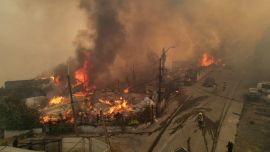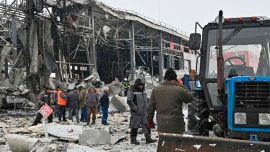Argentina's new Finance Minister Hernán Lacunza says he has made stabilising the country's battered currency his top priority, while still pledging to meet commitments made to the International Monetary Fund.
Lacunza said "guaranteeing the exchange rate is a first-order objective." He also assured that Argentina would keep 2019 fiscal targets that it set out as a condition to get a record loan of more than US$56-billion from the IMF to try to curb the country's economic crisis.
"This is a complex situation," the new treasurer told reporters moments after being sworn in as treasury minister by President Mauricio Macri.
The Buenos Aires stock market fell 7.8 percent on Lacunza's comments.
The peso – which lost 20 percent of its value last week as markets reacted to a crushing primary election defeat for President Macri – showed no signs of a bounce.
The currency opened 1.3 percent down to trade at 58.88 to the dollar.
Lacunza assumed his new role Tuesday as replacement for Nicolás Dujovne, who resigned Saturday.
"We will guarantee compliance with the fiscal targets," he told a press conference. Allowing more volatility would only add uncertainty and inflationary pressure," said Lacunza, the economy minister of Buenos Aires Province before Macri summoned him to take over from Dujovne.
"We have plenty of tools to move forward, to guarantee the tranquility of Argentines and bequeath to the next administration a consistent and robust platform to recover growth," the new minister said.
An IMF spokesman said Tuesday the Washington-based lender would shortly send a mission to Buenos Aires.
"We are closely following recent developments in Argentina and are in ongoing dialogue with the authorities as they work on their policy plans to address the difficult situation that the country is facing," IMF spokesman Gerry Rice said in a statement.
Lacunza said his focus would be "on taking care of the Argentines," adding that he was part of the president's team for nation, not for the election.
He added for "all possible bridges and channels of dialogue" were open.
"Macri's instruction is to stabilize the exchange rate," he added, saying that "a higher exchange rate is not necessary."
"What worries us most it is the situation facing the population in general," said the new appointee. " want to thank the president, Mauricio Macri, for entrusting me with the responsibility of leading the ministry."
Crash and tumble
Macri's PASO loss, and fears of a potential return to interventionist policies by a leftist administration, hit markets, crashed the peso currency and sent stocks and bonds tumbling.
"What matters now is that the starting point for [the next government] has a robust platform to be able to recover growth," said Lacunza.
After the defeat in the primary elections, Macri's administration announced a string of spending measures. They included: a temporary hike of the minimum wage, reducing payroll taxes and implementing other steps to help workers as Argentina struggles to overcome galloping inflation, high unemployment and other economic woes. But ratings agencies downgraded Argentina's debt on Friday, as investors fled the country and the outlook deteriorated.
Macri acted after the presidential ticket that includes his predecessor, Cristina Fernández de Kirchner, running as vice-president, turned in a powerful showing in primary voting for candidates going into the October general elections.
Lacunza "has the tough job of trying to come up with more measures like those announced last week, while trying to calm investors and secure IMF help," said analysts Eurasia in a note.
Populist Peronist candidate Alberto Fernández, now the clear favourite to unseat Macri, has questioned the government. He said the country is "virtually" in default and should renegotiate the IMF loan.
The country is currently in a recession and posted 22 percent inflation for the first half of the year -- one of the highest rates in the world.
However, the IMF had praised the Macri administration's performance, and said the belt-tightening reforms were starting to yield results that would spur economic growth.
The fund has released just over US$44 billion so far as part of the three-year loan programme, but many economists have said the amount is not enough to stem the tide of Argentina's economic woes.
Adjustments
Dujovne, minister since January 2017 and closely associated with the IMF deal, was seen as responsible for the economic adjustment that led to the election collapse.
Also Tuesday, Central Bank chairman Guido Sandleris warned that the recent exchange rate shock was having "a negative impact on prices." But he said the bank would continue to act to halt the currency's slide.
"Inflation will rise unfortunately in September and October," Sandleris told reporters.
In a message to reassure savers amid echoes of Argentina's 2001 crisis and the accompanying "bank freeze," he insisted the banks "have enough liquidity to deliver their deposits to those who require it."
Argentina defaulted on its debt in 2001 during the worst economic crisis in its history, and it took years before it could restore its credibility in world financial markets.
– TIMES/AFP/AP


























Comments